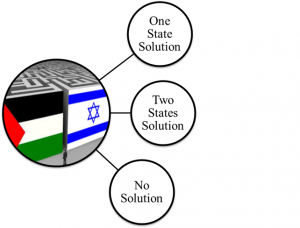by Luis Romero
 To kick off the 2013-2014 academic year, the Power, History and Society Network (PHS) hosted a workshop for Ori Swed. This served as a practice talk for Ori before his anticipated presentation at the Institute for National Security and Counterterrorism (INSCT) at Syracuse University. The event attracted members from the first-year cohort, faculty, undergraduates and the PRC. Ori Swed at Syracuse University.
To kick off the 2013-2014 academic year, the Power, History and Society Network (PHS) hosted a workshop for Ori Swed. This served as a practice talk for Ori before his anticipated presentation at the Institute for National Security and Counterterrorism (INSCT) at Syracuse University. The event attracted members from the first-year cohort, faculty, undergraduates and the PRC. Ori Swed at Syracuse University.
In this talk, Ori asks sociologists to think more carefully about how they engage and understand history in their work. Through an analysis of Israeli political narratives regarding the resolution of future Israeli-Palestinian statehood, Ori offers an interesting illustration of the symbiotic quality of discourses. Discourse studies show how narratives create and conjure potential conclusions or resolutions to a social problem. However, Ori seeks to look at the other side of this relationship and has developed a theoretical tool which he terms “historical contingency.” By this, Ori means that sociologists should look at how anticipated conclusions influence the narratives produced in the midst of an unresolved problem.
Ori’s project is as much about matters of methodology and theory as it is about discourse. He contends that oftentimes when analyzing social events, assessments are clouded by the outcome or conclusion, which is used as the lens to retroactively understand a course of events. There is a major problem with interpreting events from their culmination, particularly for historians and historical sociologists. This problem occurs because our perspective (or narrative) often changes when we learn the event’s conclusions. A simple example that addresses the psychological aspect of Ori’s point is the tale the “fox and the grapes” (known as “amor fati” or “love of destiny”). The story partly illustrates for us how, upon learning the conclusion of an event, we reinterpret the course of events. For the fox, who is eager to steal some grapes from a nearby vine, the grapes proved inaccessible in the end. Retrospectively, the fox reflects and reassesses the worth of the grapes (“Oh, you weren’t even ripe yet! I don’t need any sour grapes”) and that the branches were beyond reach. So, when we learn of an event’s conclusion, we often try to make sense of it in a way that is linear and not arbitrary.
Throughout his talk, Ori used the events of a basketball game to describe this problem. When we look at the final scoreboard of a game, it is easy to ascribe certain narratives to match the results, which ultimately negate the narratives that once existed. While this may streamline the description or theory presented, it does not account for all of the events that occurred but rather, only those that help sustain the narrative. For those readers who follow the NBA, the case of Michael Jordan presents a perfect example. Before winning his first championship in 1991, Jordan was known as a player who could score many points but also as someone who would never win an NBA championship. Year after year, Jordan would be eliminated from the playoffs, despite his high-scoring performances, reinforcing the narrative of the scoring champion who would never become an NBA champion. However, this changed after he won his first championship. The Jordan narrative was now that he was able to win championships while the previous narrative had been dropped. In this case, Ori would argue that in order to understand the complexities of Jordan’s career, it is important to understand that the narrative surrounding Jordan was not always that of champion, but also that of a good player who could not win a championship.
However, Ori offers advice to the rest of sociology. He states that because the social sciences frequently study historical events as they unfold (events such as the Arab uprisings for example), we must recognize them as contingent and variable. Ori describes in brief how many analytical frameworks, such as rational choice theory, are conclusion-driven. He cites the preeminent debate of “structure versus agency” in sociology to highlight the contingent quality of social life and the trouble scholars have in accounting for it. In short, by keeping in mind that the moments we are interested in are fluid and contingent, sociology can add a layer of nuance that is not readily found in many works. In the end, Ori is implicitly advocating for more rigorous sociology and believes that using historical contingency as a tool can help sociology accomplish this goal.
